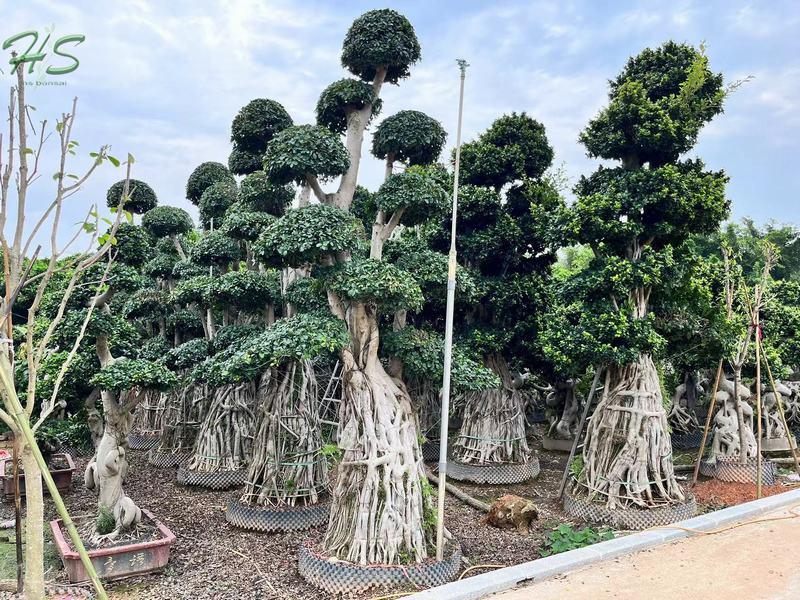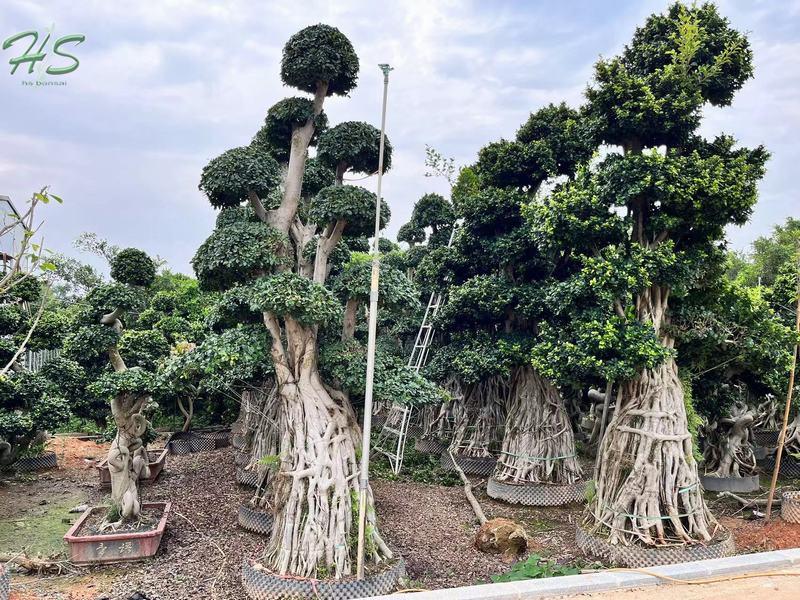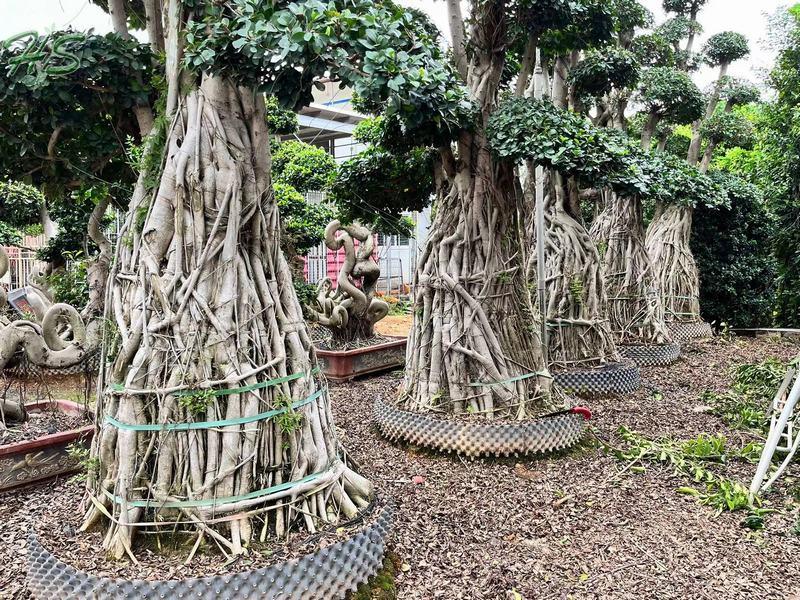Multi-Root Ficus Bonsai: The Epic Art of Miniaturization
In the intricate world of bonsai, the multi-root ficus stands as a unique and captivating display of nature's miniaturized magnificence. BonsaI, derived from the Japanese term meaning "tree in a pot," is the art of cultivating and arranging small trees to simulate their appearance in nature. The multi-root ficus bonsai is a distinctive subset of this art, showcasing the beauty of a tree with multiple trunks growing from a single root system.
The multi-root ficus bonsai is prized for its unique appearance, often resembling a cluster of trees or even a small forest. This effect is achieved by carefully pruning and training the branches and trunks to grow in harmony, creating an illusion of unity while maintaining individuality. The roots, often exposed, twist and turn, adding to the naturalistic allure of the piece.
Cultivation of a multi-root ficus bonsai begins with the selection of a suitable tree. The ficus genus, known for its adaptability and resilience, is a popular choice due to its ability to develop multiple trunks from a single root system. The process involves pruning and pinching to encourage multiple leaders and create a balanced and pleasing form. Over time, the tree's roots also develop, creating a strong and stable foundation.
The care and maintenance of a multi-root ficus bonsai is crucial to its long-term health and development. Regular watering, feeding, and pruning are essential to maintain the health of the tree. Proper lighting and humidity levels must also be considered to replicate the tree's natural environment. The bonsai artist must possess patience and skill to nurture and shape the tree into a masterpiece.
The multi-root ficus bonsai offers an unparalleled expression of nature's power and beauty. It's an ongoing labor of love that requires dedication, patience, and skill. For those who appreciate the artistry and serenity of bonsai, the multi-root ficus offers a captivating addition to any collection.
Item NO.:
HSDSPayment:
T/TProduct Origin:
ChinaColor:
GreenShipping Port:
Xiamen portLead Time:
7-10day
The Multi-Faceted Beauty of the Multi-Root Ficus
The multi-root ficus bonsai is prized for its unique appearance, often resembling a cluster of trees or even a small forest. This effect is achieved by carefully pruning and training the branches and trunks to grow in harmony, creating an illusion of unity while maintaining individuality. The roots, often exposed, twist and turn, adding to the naturalistic allure of the piece.
Cultivation of a multi-root ficus bonsai begins with the selection of a suitable tree. The ficus genus, known for its adaptability and resilience, is a popular choice due to its ability to develop multiple trunks from a single root system. The process involves pruning and pinching to encourage multiple leaders and create a balanced and pleasing form. Over time, the tree's roots also develop, creating a strong and stable foundation.
The care and maintenance of a multi-root ficus bonsai is crucial to its long-term health and development. Regular watering, feeding, and pruning are essential to maintain the health of the tree. Proper lighting and humidity levels must also be considered to replicate the tree's natural environment. The bonsai artist must possess patience and skill to nurture and shape the tree into a masterpiece.
The multi-root ficus bonsai offers an unparalleled expression of nature's power and beauty. It's an ongoing labor of love that requires dedication, patience, and skill. For those who appreciate the artistry and serenity of bonsai, the multi-root ficus offers a captivating addition to any collection.
The Multi-Root Ficus, a captivating specimen of nature's art, deserves recognition for its unique and multifaceted qualities. This resilient plant, with its intricate roots and lush foliage, offers a symphony of visual delights.
The multi-root ficus's most arresting feature is undoubtedly its roots. Unlike other plants, the multi-root ficus boasts multiple roots that branch out in a lattice-like structure, giving it a sense of depth and drama. These roots are not just aesthetic; they also play a crucial role in the plant's survival. They anchor the plant firmly in the soil, ensuring stability even in the face of strong winds or rainstorms.
The leaves of the multi-root ficus are a study in contrast and texture. They unfurl in a vibrant green that complements the rich soil it thrives in. The leaves' unique shape and size add to the plant's allure, each one different from the next, much like the fingerprint of nature. Their smooth texture and alternating patterns of light and shadow create an enticing visual effect that is both pleasing and captivating.
The multi-root ficus's adaptability is another of its strengths. It thrives in various environments, from sun-drenched windowsills to shady corners, making it a versatile addition to any indoor or outdoor space. This adaptability is a testament to the plant's resilience and versatility, qualities that make it a cherished choice for plant enthusiasts.
In conclusion, the multi-root ficus is more than just a plant; it's an embodiment of life's resilience and beauty. Its roots symbolize stability, its leaves represent diversity, and its adaptability speaks to its strength. The multi-root ficus is a testament to nature's wonders and a reminder of the importance of preserving and celebrating all life's magnificent forms.
Take care tips
|
Item name: |
Unique Aerial Root Horse Shape Ficus Microcarpa Bonsai Landscaping Tree For Town |
|
Common name: |
Ficus tree, Monroe Ficus, Figs, Chinese Banyan, Strange ficus root |
|
Standard: |
Ficus microcarpa bonsai horse ficus aerial root for outdoor landscaping. |
|
Temperature: |
The best temperature for ficus growing is 18-35 ℃. In winter, the ficus will be frost when the temperature under 10 ℃. Shortage of sunshine will make the leaves yellow and undergrowth |
|
Water: |
We suggest feed ficus bonsai enough water is necessary. Soil should be always wet. In summer, leaves should be sprayed water as well. |
|
Sunlight: |
The ficus likes the full sunlight. |
|
Fertilizer: |
Liquid feed during active growth in late spring and summer. higher frequency watering while feeder to avoid drug injury. |
|
Packing: |
Packed with cocopeat and then into container |
|
Delivery time: |
7-14 days after confirmed for stock quantity |
Product Overview



